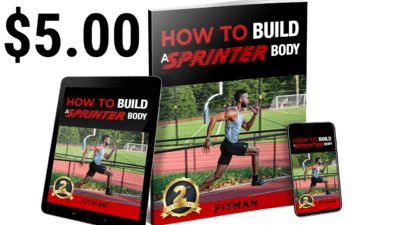Speed kills.
Every athlete in sports that involve sprinting want to know how to sprint faster. The problem is that nobody is actually training for pure speed.
Most athletes are following programs on and off the track that will not increase their top-end, linear speed.
After using these ill-fated programs they end up with the same speed or they end up inheriting the speed of a sloth due to the abysmal nature of the training, nutrition, and recovery.
Most “speed” training is completely misguided.
Training for pure speed is not high-volume running, bodybuilding, speed ladder drills, or powerlifting. Training for speed puts the top priority on speed.
In this new series we are going to examine the top 5 ways to increase your sprinting speed.
By applying these tips to your training program, you will be able to see real PR’s when you hit the track.
The first 2 ways you can sprint faster are:
How To Sprint Faster Through Better Sleep
When an athlete is having a lousy performance at the track or at my performance training center, the first question that I always ask is “How did you sleep last night?”
When the answer is anything less than 7 deep, quality hours, then we have figured out why the athlete has a performance comparable to my Sixers during the early stages of the Process.
The Power Of Sleep
The most important factor when it comes to maximizing your performance on the track is sleep.
Deep sleep has restorative powers that are not rivaled by any food or supplement in this world.
Sprinting is a neural exercise. This means that your performance on the track is directly connected to how fresh and recovered your central nervous system (CNS) is.
Having a deflated CNS is not good for any discipline. But it will literally end your sprint session before you even get to the start line especially if your only goal is training for speed development.
If your CNS is drained your reaction time and the amount of force you can put into the ground with each step will both be reduced.
A sprinter who cannot get out of the blocks or generate more force during the race cannot be an effective sprinter.
Any sprinting done at 90 percent of your maximum speed and above will drain your CNS. That is the nature of any high intensity exercises like sprinting, jumping, or heavy deadlifts and squats.
The difference between the athletes who get faster and the ones who remain stuck in quicksand is recovery.
Whoever lets their CNS recover properly by prioritizing sleep will have the better long term gains in speed.
The athletes who cannot bring their times down are the ones who are not letting their CNS recover through restful sleep.
There is one thing you can do to improve the quality of your sleep and allow yourself to make progress on the track.
1) Change your sleep environment
You will be losing the battle for great sleep if you are being externally stimulated by light or noise.
If you are currently sleeping in a room that has a lot of external light or noise, then your sleep quality is not being maximized.
Having your laptop, TV, and cell phone all shoot blue light into your eyes does not help either.
Recent observations (Gunnars, 2019) have shown that the blue light that is emitted from these devices can suppress your melatonin production.
I have personally experienced this. Having lower melatonin levels at night will make it harder for you to fall asleep.
One of the best things I did to reduce the amount of blue light my eyes receive at night was to purchase some blue-light glasses and an eyemask.
The blue-light glasses allow me to use those devices at night without additional stimulation. I don’t wear glasses, so I feel extra studious when I put them on as well.
When I was young I used to think an eyemask was for the sadity folks, but they were actually onto something.
The darkness that the eyemask provides has improved my sleep quality. As a result I have had a few years of the best sleep I have had since my teenage years.
Your curtains can affect the quality of your sleep too.
Lighter colored curtains will let more light into your room. Once the sun hits your eyes, your body begins to naturally wake up.
If you begin to wake up before your body was fully recharged, it will directly affect your performance on the track.
I suggest if you do not have an eyemask to invest in blackout curtains for your room.
Noise can also be a hindrance to a great night of sleep.
If you have noise coming in from vehicles or loud neighbors who have no couth, then it will also be tough for you to nod off into Dreamland.
We used to live on a main road in Philly. For a few years my sleep quality was lousy just like a typical meatheads’ workout program.
Every night a combination of buses, cars, people talking/fighting, cops, or the ambulance would make it difficult to fall asleep.
Over time we moved to a quieter neighborhood and falling asleep is dramatically easier.
Sleeping in a dark, quiet room is your best bet to get consistent sleep. By changing your current sleep environment, you can recharge your CNS and improve your speed on the track.
Bonus: How To Get Faster By Reading Use Speed To Get Lean
So you can learn about my new eBook, Use Speed To Get Lean by watching the video below.
This is the first book in the fitness game to combine the power of sprinting and lifting workouts to help you build a phenomenal body.
Stay tuned for part II of this series.
References:
Gunnars, Kris BSc. (2019) Blue Light and Sleep: What’s The Connection? Retrived from https://www.healthline.com/nutrition/block-blue-light-to-sleep-better


